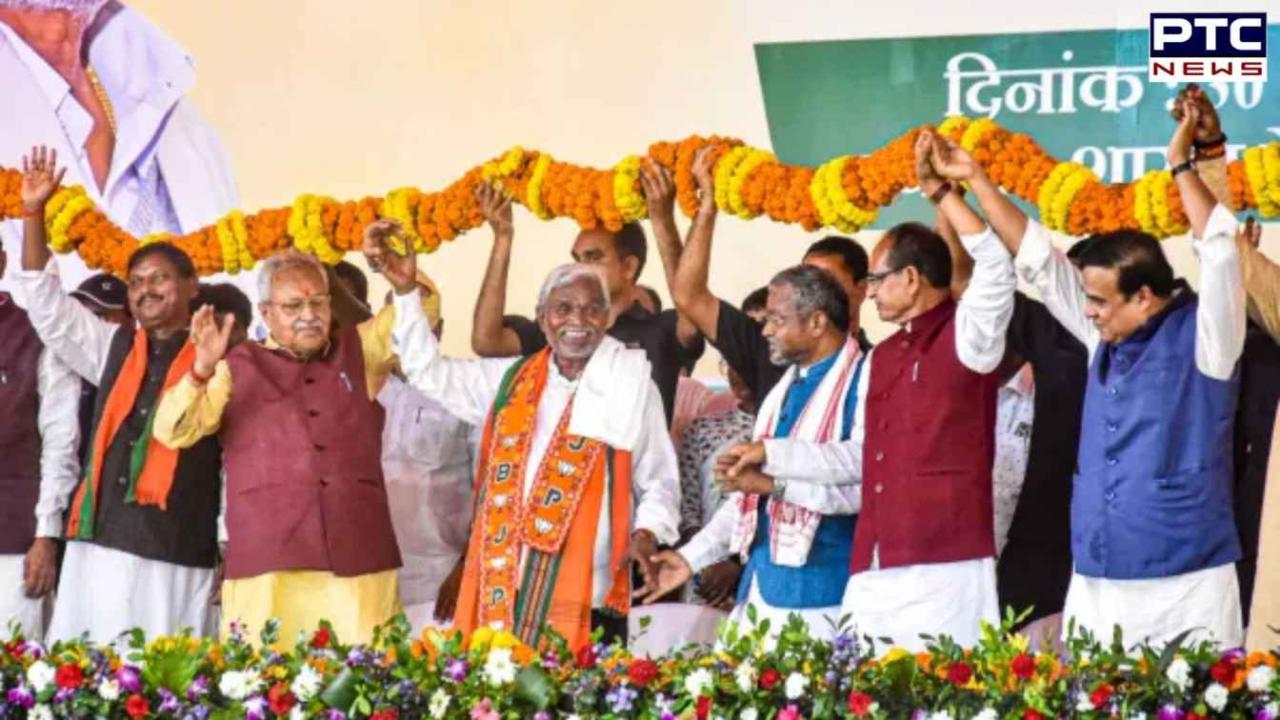BJPs strategic blueprint: Gaining ground ahead of Jharkhand elections

PTC News Desk: As the political climate intensifies in the lead-up to the Jharkhand assembly elections, the Bharatiya Janata Party (BJP) is strategically positioning itself to reclaim its influence in the state. With a comprehensive plan that encompasses grassroots mobilisation, opinion polling, strategic alliances with regional powers, and a focused approach to tribal issues, the BJP is gradually carving out an advantage.
BJP's Strategy: A Detailed Look
Grassroots Engagement: The 'Raishumaari' Initiative
At the heart of the BJP's strategy is the 'Raishumaari' (seeking opinion) initiative, designed to deepen its connection with party workers. While this method is not entirely new, it has been expanded significantly this election cycle.
The BJP is actively consulting thousands of party workers down to the panchayat level, a departure from previous elections that primarily involved feedback from block-level leaders. This time, the party aims to gather insights from approximately 500 to 700 workers per constituency.
This comprehensive approach not only fosters internal unity but also builds trust among party cadres, which is essential in a state where grassroots involvement is paramount. By understanding local preferences, the BJP can identify candidates who resonate with the party's grassroots, ensuring that its selections reflect the realities on the ground. The candidate selection process will involve secret ballot scrutiny, marking a shift from the traditional top-down selection model to a more democratic approach.
Also Read: PM Narendra Modi holds talks with Sikh delegation in New York
Strengthening Alliances: Consolidating the NDA Front
A vital component of the BJP's strategy in Jharkhand is consolidating alliances within the National Democratic Alliance (NDA). In contrast to the 2019 assembly elections, where the BJP contested independently, the party is now aligning with influential regional parties such as the All Jharkhand Students Union (AJSU) and possibly the Janata Dal United (JDU).
This coalition aims to unite a broader base of voters, including demographics that previously remained outside the BJP's reach.
The AJSU is particularly crucial, having traditionally held sway in several tribal regions. By collaborating with AJSU chief Sudesh Mahto, the BJP hopes to reclaim tribal votes lost in the last elections. Negotiations with the JDU for seat-sharing are reportedly nearing completion, and finalizing this alliance could enhance the BJP's prospects in constituencies where regional identity politics significantly influence voter behaviour.
Also Read: Devotee alleges tobacco found in Tirupati laddu, shares video amid controversy over animal fat
Focusing on Tribal Issues: Engaging Key Demographics
Central to the BJP's strategy is a renewed emphasis on tribal issues. The tribal population in Jharkhand, which largely supported the Jharkhand Mukti Morcha (JMM) in previous elections, is now being actively courted by the BJP.
The party's induction of notable tribal leaders such as Champai Soren and Geeta Koda is a strategic move aimed at bolstering its appeal among tribal voters. Champai Soren's recent defection from the JMM to the BJP is expected to play a crucial role in regaining support in the Kolhan region, which is vital for tribal politics in the state.
The BJP’s focus on safeguarding tribal identity and addressing concerns over illegal immigration has resonated deeply with tribal voters, particularly in the Santal Pargana region, home to numerous tribal-reserved seats. The party's narrative surrounding illegal infiltration and its potential threat to tribal identity has gained traction, positioning the BJP as a serious advocate for tribal interests.
Also Read: SEBI imposes Rs 1 crore fine on Anil Ambanis son Jai Anmol Ambani in Reliance Home Finance case
JMM's Vulnerability: Internal Struggles and Anti-Incumbency Sentiment
As the BJP refines its strategy, the ruling JMM is exhibiting signs of vulnerability. Chief Minister Hemant Soren faces significant internal challenges, with notable leaders such as Champai Soren defecting from the party, highlighting growing dissatisfaction with the leadership. This internal dissent poses a public relations challenge for the JMM and signals to voters that the party is struggling to maintain unity.
Additionally, the JMM is confronting a rising anti-incumbency wave, exacerbated by allegations of corruption and unfulfilled promises. The BJP has been quick to exploit this sentiment, framing the election as a referendum on Soren's governance. With public sentiment shifting due to economic hardships and accusations of mismanagement, the JMM's electoral prospects appear increasingly precarious.
Also Read: PM meets Ukraine's Zelenskyy in US, reaffirms support for peaceful resolution of conflict
The Political Landscape Ahead
As Jharkhand approaches its critical elections, the BJP's meticulous groundwork, strategic alliances, and focused outreach to tribal communities are providing it with a competitive edge. The expansion of the 'Raishumaari' initiative, emphasis on grassroots involvement, and efforts to solidify the NDA reflect the BJP's commitment to leaving no stone unturned in its quest to regain control.
In contrast, the JMM's internal discord and waning popularity place the ruling party in a defensive position. The upcoming election will likely hinge on how effectively the BJP capitalises on the JMM's vulnerabilities while the latter struggles to stabilise itself in the face of a growing opposition tide. As the political landscape evolves, both parties will need to adapt and respond to the dynamic needs and sentiments of Jharkhand's electorate.
Also Read: Supreme Court notice to Punjab on Himachal Pradesh's plea to dismiss civil suit on Shanan project
